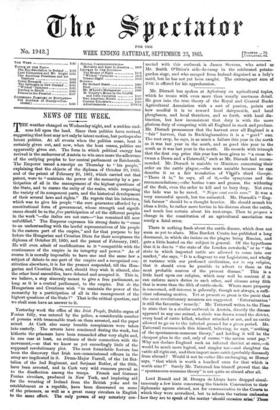NEWS OF THE WEEK.
rnHE weather changed on Wednesday night, and a sudden cool- ness fell upon the land. Since then politics have revived, suggesting that heat may not onlybe latent motion, but perhaps also latent politics. At all events when the politics cease, heat is certainly given out, and now, when the heat ceases, politics are apparently given out. The form in which political energy has revived is the .endeavour of Austria to win once more the adherence of the outlying peoples to her central parliament or Reichsrath. The Emperor issued a rescript on Thursday to "his people," explaining that the objects of the diploma of October 20, 1860, and of the patent of February 26, 1861, which carried out that patent, were to "maintain the power of the monarchy by a par- ticipation of all in the management of the highest questions of the State, and to ensure the unity of the realm, while respecting the variety of its component parts, and the historical development of their several laws and rights." He regrets that his intention, which was to give his people "the sure guarantee afforded by a constitutional form of government, whose strength and signifi- cance should be in the free participation of all the different peoples in the work "—the italics are not ours—" has remained till now unfulfilled." The Emperor expresses his strong desire to "come to an understanding with the lawful representatives of his people in the eastern part of the empire," and for that purpose to lay before the Hungarian and Croatian Diets for their acceptance the diploma of October 20, 1860, and the patent of February, 1861. He will even admit of modifications in it "compatible with the continuance of the empire in its integrity and power." As of course it is morally impossible to have one and the same law a subject of debate in one part of the empire and a recognized con- stitution elsewhere, it is for the present suspended, till the Hun- garian and Croatian Diets, and, should they wish it altered, also the other local assemblies, have debated and accepted it. This is, we believe, a step sincerely meant to give a free parliament, so long as it is a central parliament, to the empire. But do the Hungarians and Croatians wish "to maintain the power of the monarchy by a participation of all in the management of the highest questions of the State ?" That is the critical question, and we shall soon have an answer to it.






























